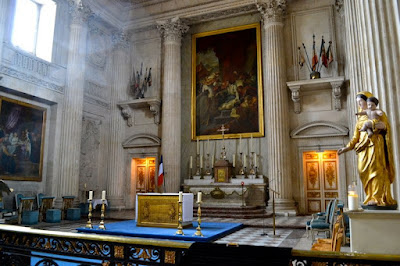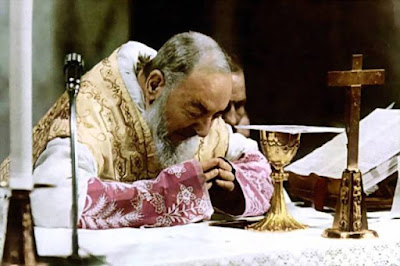 |
| Chapelle l'école Militaire, where Napoleon made his confirmation |
Recently I was invited to a confirmation, which was held in the same chapel where Napoleon made his confirmation 200 years earlier. It is part of the French Military Academy, in Paris.
When Napoleon was taking over Europe in the 19th century, he met the Cardinal of Paris and he told him that he intended to take over and destroy the Vatican. The Cardinal told him that he wouldn’t be able. Napoleon assured him that he would. The Cardinal said to Napoleon, ‘We priests have been trying to destroy the Vatican for the last 1800 years and we haven’t been able. You won’t either.’
I have often heard people say in interviews, ‘I’m not very religious, I just go to church on Sundays,’ or words to that effect. I think we often put ourselves down and underestimate how much faith we have. The truth is that if you didn’t believe in God, in Jesus coming to us in each mass, that God works through the priest in the mass, you wouldn’t come here. This means that you probably have far more faith than you give yourself credit for. If we really didn’t believe these things, we wouldn’t come here, because apart from faith, what we believe in makes no sense.
Today’s readings make an interesting point. In this encounter between Jesus and Peter, Peter has come to realize that Jesus is the Christ, the one promised by God. The Father in heaven has revealed it to Peter and Jesus points this out to him. He didn’t come to this conclusion by himself. It was a revelation from God. And because of this Jesus knows that Peter is the one who has been chosen as the first leader of the Church.
This also tells us that the fact that we believe in God means we have been given the gift of faith. You might think you just learnt about it from your parents, but the fact is that many other people also learnt about it from their parents and don’t believe, so there must be more to it than that. No human being on their own, will convince you of God, even with the best arguments. I could stand here for hours and try to give you impressive explanations of why we should believe in God, but if the Spirit of God does not touch your heart, I would be wasting my time. It is only God who can convince you of his presence. The only thing we need in order to receive this gift, is an open heart. If we are open God will make himself known to us, because that is what God wants for us. The more open we are, the more God will reveal himself to us. That is why before every mass I pray that the Spirit will anoint the words I speak, so that your hearts may hear what God wants you to hear.
 |
| St. Peter's Basilica, Rome |
The second thing that Jesus said to Peter tells us why we need the Church. Sometimes you will hear people say that they want God, but not the Church. Jesus said: ‘You are Peter and on this rock I will build my Church.’ He also said, ‘Whatever you bind on earth will be considered bound in heaven and whatever you loose on earth will be considered loosed in heaven.’ In other words, Jesus was giving his authority to Peter and his followers to act and make decisions in his name. The decisions they made on earth, would be recognized by the Father in heaven.
Why would God give his authority to a group of ordinary, weak people, to represent him and speak on his behalf? It means that God would be working through these people, through his Spirit who guides the Church, who guides us all. So the Lord was saying, ‘I am going to work through human instruments, but it is my Church and it is my Spirit that will guide it.’ If you find that idea hard to believe, just think for a minute of all the different empires and superpowers that have come and gone over the centuries: the great Chinese empires, the Roman Empire, people like Napoleon, Hitler, Communist Russia and all the different nations that were super-powers. They were all powerful, well organized and wealthy and yet they have all come and gone and they are no more. Why? Because they were of human origin. How is it that the Church is still here—and not only still here, but still growing—considering we have had centuries with plenty of bad example, scandals, bad preaching, etc? The only reason the Church is still here, is because it is from God and it is God who is continually acting through it, in spite of all the mistakes we make, and we have made plenty.
The history of the Church is nothing to boast about. It was Jesus’ plan to have a Church and to work through it, so that we would have a very concrete way to relate to God and so He guides us through his Church and shows us the path to follow. So today, 20 centuries after Christ, here I am still passing on the message to you and even if I make a mess of it, the Lord will teach us what we need to know, just as long as we go on being open to him.
Jesus also said, “Anyone who listens to my teaching and follows it is wise, like a man who builds his house on solid rock” (Matt 7:24). Jesus is saying, don’t build your faith on ‘nice ideas,’ or just the things that suit you. We need a solid foundation for our faith, or it won’t last. God gives us that foundation through the teachings handed on by the Apostles and bishops down through the centuries.
Every so often I have met people who have told me that they believe in a little bit of this and a little bit of that, sometimes from different religions, maybe with some superstition thrown in. That is what Jesus is referring to when He says, ‘Anyone who does not listen to me is like someone who built their house on sand.’ It won’t last. When there is any challenge to it, it will collapse, because it has no foundation. Our faith needs a solid foundation, and that is what the Lord gives us through his Church.
At this time there is a lot of turmoil even within the Church, with ideas being put forward which are not Church teaching. Don’t let that disturb you. It’s not the first time this has happened and certainly won’t be the last.
If you are confused about any teaching, just go to the Catechism. It is a whole compendium of the Lord’s teaching which He has given us through his Church.
And perhaps the most important line in today’s Gospel, ‘You are Peter and on this rock I will build my Church and the gates of the netherworld shall not prevail against it.’ ‘The gates of the netherworld shall not prevail against it.’ The powers of darkness may seem to be getting the upper hand, both in our world and in our Church, but Jesus himself tells us that those powers can not overcome his Church, because it is his Church. It is not of human origin. Pope’s will come and go, bishops will come and go, priests will come and go, but the Lord’s Church remains constant because it is from God. So don't be disturbed with all the changes. Everything is in God's hands and nothing can happen which the Lord does not permit.
‘You are Peter and on this rock I will build my Church and the gates of the netherworld shall not prevail against it.’











